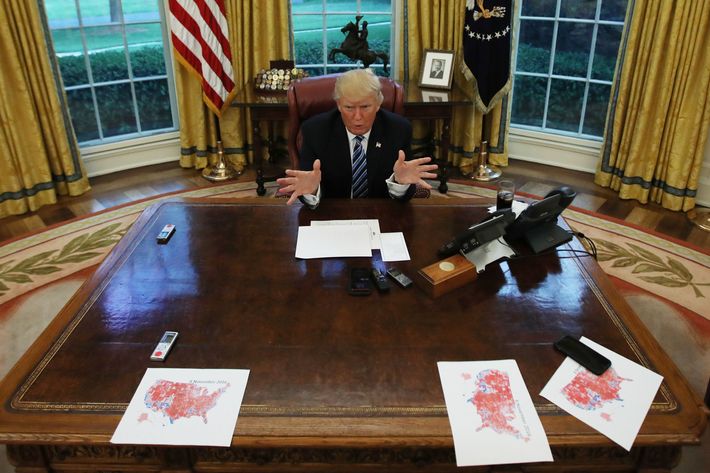The Specter of Illegitimacy Haunts Trump’s First 100 Days

Donald Trump narrowly won his party’s nomination despite the clear misgivings of his party’s professional class, which viewed him as erratic, uninformed, and dangerous. He won the presidency despite losing by an unprecedented three million votes nationwide, with the benefit of extraordinary interventions by the FBI director and Russian intelligence to help criminalize and discredit his opponent. All these things add up to a crisis of legitimacy. And yet, rather than confronting the crisis of legitimacy hovering over them, all the actions Trump and his governing partners have taken over their first 100 days have deepened it.
Trump may have few traditionally defined achievements so far, but he has redefined the institution he occupies. Before Trump it would have been outrageous for a president to withhold his tax returns, and unthinkable for one to retain business holdings in office. Breaching both of those bygone norms together has created a change much larger than the sum of the two. He has constructed a full-on nontransparent oligarchy. The arrangement is more easily recognizable to autocrats than to Americans, which is why China’s government identified Jared Kushner as what is known in their system as a “princeling.”
Trump’s Republican allies have shut down Democratic bills to compel the president to disclose his tax returns, and raised no objection as his family has used his office to leverage their brand across the country and the globe. They have likewise slow-walked investigations into whether his campaign colluded openly with Russian hackers, or whether it was simply the unwitting beneficiary. Whatever comes out, the already-public evidence — from the financial ties between Russia and numerous Trump advisers, to Trump’s open exhortation for Russia to hack his opponent’s emails — implies the most devious subversion of the national interest since Richard Nixon covertly sabotaged the 1968 peace talks in Vietnam.
The most shocking degradation of office is the lowering of the standards of the office he has carried out. Whatever doubts Trump inspired about his fitness for office seem naïve in comparison to what has transpired. The president is childlike, impulsive, ignorant, and ostentatiously lazy. He refuses either to perform his job or to delegate it to others. Instead, his staff tiptoes around as though they have taken custody of a child monarch. “If you’re an adviser to him, your job is to help him at the margins,” one Trump friend told Politico. “To talk him out of doing crazy things.”
One might even posit that Trump hates this job altogether, but how much?
There is an endless supply of alarmed anecdotes and leaks from inside the administration attesting to this, yet nobody within the administration has quit to warn the public of the president’s dangerous unsuitability. Indeed, essentially all the leaks about his dysfunctional performance have appeared in the mainstream media, which the Republican base has spent years learning to ignore. Trump has held his base because he still commands the loyalty of party officials, and within the conservative news bubble he remains the decisive, alpha-male executive he played (and still tries to play) on television. This may explain why Trump’s tweeting is one of the few aspects of his performance Republican voters dislike — it is their sole, tiny window into his pathology.
The bond fastening Trump with his governing partners is their mutual determination to exploit their majority to the hilt. Republicans routinely depict his popular-vote defeat as a kind of acclamation victory. (“The president won overwhelmingly,” insisted Chief of Staff Reince Priebusrecently, in the sort of absurd lie that has grown so routine that it is no longer corrected.) They have continued to try to jam through a horrific health-care plan, even though three-fifths of the public prefers keeping and improving Obamacare to repealing and replacing it, and less than one-fifth approves of the specific Republican alternative. While three-quarters of the country believes that the wealthy and corporations don’t pay a high enough tax rate, Republicans have made it their priority to reduce it. They have blocked an independent investigation of the president’s ties to Russia even though 73 percent of the public wants to establish an independent investigation.
Trump seems never to have considered the possibility of moving toward the center and working with Democrats on policy. Nor have Republicans shown any inclination to cooperate with Democratic demands to conduct basic oversight of Trump’s corruption and scandals. These two decisions, no oversight and no bipartisan legislation, seem linked. The implicit threat of exposing Trump to investigations is the lever Republicans in Congress have to ensure his fealty to conservative movement dogma rather than adopt more moderate and popular policies. This pact to maintain the Republican monopoly on power at all costs is a strategy shaped by the legitimacy crisis of the Trump presidency.
The story of Trump’s 100 days is in many ways a cheerful one for large- and small-d democrats alike. Trump’s authoritarian tendencies amount to little more than a verbal tic. The party’s legislative agenda has proven astonishingly inept. He attacks journalists as enemies of the people and dismisses the legal authority of the courts, but has proven either unwilling or unable to follow through.
Yet while the fears of what Trump might do to the country out of malevolence have subsided, the fears of what he might do to it out of incompetence have grown. Trump became president because America’s political institutions failed. What remains to be seen is whether those institutions can separate Trump’s failure from the country’s
No comments:
Post a Comment